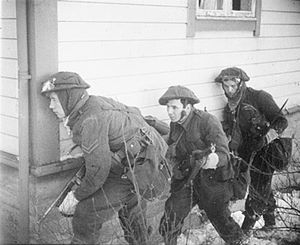Operation Archery
| Operation Archery | |||||||
|---|---|---|---|---|---|---|---|
| Part of World War II | |||||||
 Commandos in action during the raid |
|||||||
|
|||||||
| Belligerents | |||||||
|
|
|
||||||
| Commanders and leaders | |||||||
|
|
|
||||||
| Strength | |||||||
| 1 cruiser 4 destroyers Unknown number of aircraft 570 men |
Coastal artillery Unknown number of ships air support 150 infantry 50 sailors 1 tank (Panzer I Befehlswagen) 100 men of the German Labour Corps |
||||||
| Casualties and losses | |||||||
| 22 killed 57 wounded 1 cruiser lightly damaged 8 aircraft lost |
55–85 killed 98 captured 10 ships sunk |
||||||
|
Civilian casualties |
|||||||
Civilian casualties
Operation Archery, also known as the Måløy Raid, was a British Combined Operations raid during World War II against German positions on the island of Vågsøy, Norway, on 27 December 1941.
The raid was conducted by British Commandos of No. 3 Commando, two troops of No.2 Commando, a medical detachment of No.4 Commando, a demolition party from 101 Troop (canoe) of No. 6 Commando and a dozen Norwegians from Norwegian Independent Company 1. The action was supported by Royal Navy gunfire, led by the light cruiser HMS Kenya, with the destroyers HMS Onslow, Oribi, Offa and Chiddingfold. The submarine HMS Tuna was in support as the force navigational check. For troop transport the Prince Charles and Prince Leopold were used. Also in support were Royal Air Force bombers and fighter-bombers.
The commando force of 570 troops was divided into five with these objectives.
Central to the operation was the destruction of fish-oil production and stores which the Germans used in the manufacture of high explosives. Another intention was to cause the Germans to maintain and increase forces in Norway which otherwise might be employed on the Eastern Front.
...
Wikipedia
